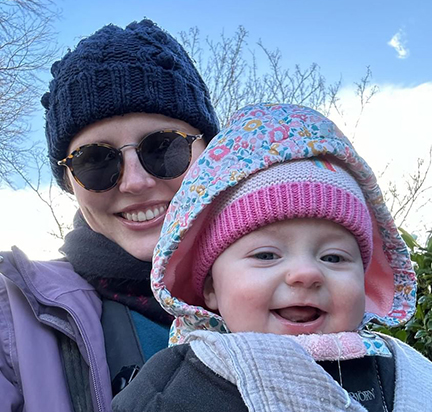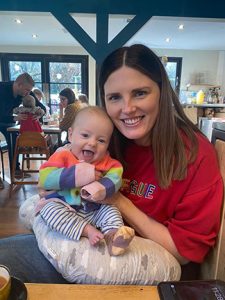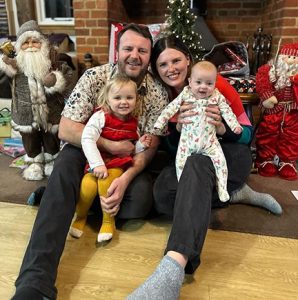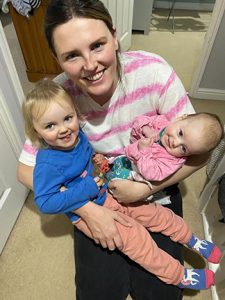Blog
She Never Imagined Being a Sick Parent

“Do you mind if I just change her nappy?” We were midway through our conversation when Gussie Blake noticed Grace, her 5-month-old daughter whom she had been cooing at throughout our Zoom call, fussing.
“Of course not,” I said. Gussie carried on talking as she got up, moving Grace and the phone with her as she changed Grace’s diaper.
Grace is Gussie’s second daughter—an unexpected blessing. She didn’t know if she’d ever get pregnant again. Two years earlier, shortly after her first child, Evie, was born, Gussie was diagnosed with vasculitis. At the urging of her rheumatologist, she went on cyclophosphamide. She worried: Will it impact my fertility? Will it rob me of becoming a mother again?
It was a Thursday when Gussie’s kidney biopsy results came back confirming vasculitis. Gussie can still remember every detail of that moment: exactly where she was sitting in the room, what she was wearing. She remembers looking out the window and noting how surreal it was; it looked like a typical day. “That moment will literally stay with me for the rest of my life,” she said.
She was scheduled for chemotherapy the following week. At the time, she was a new mom to her infant Evie. Gussie still remembers that first shift, the way her new diagnosis upended motherhood for her for the first time: “The doctors told me, ‘You have this weekend to stop breastfeeding.’”
 “My God,” Gussie remembers. “I was exclusively breastfeeding at the time. We rushed to try a bottle and she
“My God,” Gussie remembers. “I was exclusively breastfeeding at the time. We rushed to try a bottle and she
wouldn’t take it.” Gussie still has a photo from that weekend. Her husband wanted to capture her last breastfeeding with their new daughter. “I don’t know why he took the photo,” Gussie laughed. She thinks it was meant to be a thoughtful and candid memento, something to look back on once she had finished treatment. Instead, Gussie said, “I looked horrendous in the photo because I was crying, I was bright red, I had mascara around my eyes.” She went on, laughing, “Breastfeeding is such a weird thing because it ruins your life. You’re getting up in the middle of the night, you’re exhausted, it’s overwhelming.” And, yet, she couldn’t stop sobbing in that photo because, as hard as it was, she felt robbed.
“It was absolute grief,” Gussie admitted. “What I couldn’t handle was the thought that my breast milk was nourishing her, it’s what had been keeping her alive. Then, suddenly, it was going to become toxic. I really struggled mentally with the idea that I was going to leave Evie at home with my husband, go to the hospital, have this drug, come back and never breastfeed her again.”
As Gussie embarked on those first cyclophosphamide treatments, she was swirling in uncertainty and fear: “I was just so scared that I was going to be too ill to look after Evie; I was afraid of being a sick parent.” Gussie’s mom has bipolar disorder and was housebound; she remembers how hard it was, sometimes, being her daughter. “I just never, ever imagined I would be a sick parent like that. I’ve always looked after myself, exercised, eaten well, and been very active. To suddenly think I could not be that because of something I have no control over was really hard … I couldn’t believe there might be a scenario where I wouldn’t get to watch my kids grow up.”
The first time Gussie mentioned to the nurse who was looking after her that she wanted to have a second child, the nurse told she had never had a patient with vasculitis who got pregnant. It was completely unfamiliar territory and she wasn’t sure it would be possible. But Gussie knew she wanted this—and she was going to push to make it happen.
Eventually, she found the perfect doctor for her, a high risk fetal medicine doctor who was open and prepared to guide her through pregnancy with vasculitis. Before and during her pregnancy, her doctor worked closely with her rheumatologist to prepare her body, manage her medications, and closely monitor her health.
Gussie also began reaching out to other women who knew what it was like to walk in her shoes. “Before I even got pregnant, I messaged lots of other women who had vasculitis and spoke to them about what treatment options they chose and how long it took them to get pregnant. Just hearing that there were lots of women who had vasculitis and still got pregnant gave me such hope.”
 A month into trying, her hope became real: Gussie was pregnant. Grace, her second daughter, was on the way.
A month into trying, her hope became real: Gussie was pregnant. Grace, her second daughter, was on the way.
When I spoke to Gussie, she was insistent on sharing her story: she wants to offer what those other women with vasculitis gave her—hope.
But, more than that, she has a message: “Believe pregnant and postpartum women when they say something isn’t right.”
When Gussie first experienced mysterious symptoms after the birth of her first daughter, she was repeatedly dismissed. “It’s because you just gave birth,” doctors would say to her over and over again. “They’d say it even when it didn’t make sense,” Gussie explained to me. She was experiencing severely aching joints, night sweats, insomnia, scleritis, and more. When she presented to one doctor, a woman, with blood in her urine, the doctor said, “Have you come on your period? Maybe that’s why there’s blood in your urine.” “Wow,” Gussie thought. “So much for women supporting women.”
Gussie had been frantically researching online, and the word “vasculitis” kept appearing in response to her searches of her symptoms. Still, doctors would look her in the eye and say, “You don’t have vasculitis. It’s all post-pregnancy related. Weird things happen after pregnancy.” Gussie felt like she was going crazy. “I told my husband, I feel like maybe I’m making this up. I’ve absolutely lost the plot.” She felt gaslighted.
Eventually, after endless and exhausting advocacy for herself, Gussie got a doctor to believe her. She pushed for a kidney biopsy. The biopsy confirmed what she already assumed: she had vasculitis.
To other young women, Gussie wants to impart a message: “It’s so important to advocate for yourself. Even when doctors think they know better, remember: We know our bodies.”
 Today, Gussie loves being a mom. “Because I’m not that close to my own mom, I think I’ve loved sort of fixing history and being the kind of mom I always wanted,” she said. But her favorite part of motherhood is the extraordinary miracle of creating life: “Just looking down at your children and knowing they are a part of you …” Gussie trailed off. “Every time I watch them grow or a new part of their personality comes out, I get so excited for the future and who they’re going to become.”
Today, Gussie loves being a mom. “Because I’m not that close to my own mom, I think I’ve loved sort of fixing history and being the kind of mom I always wanted,” she said. But her favorite part of motherhood is the extraordinary miracle of creating life: “Just looking down at your children and knowing they are a part of you …” Gussie trailed off. “Every time I watch them grow or a new part of their personality comes out, I get so excited for the future and who they’re going to become.”
There is more to come: Gussie and her husband want to have one more child. “A boy?” I asked her. She laughed. “My husband would love a boy, but I would be happy with either. I’d love three girls.”
Gussie doesn’t plan on being seen as the sick parent. Instead, she wants her girls to know that you can have a challenging disease and “still live a normal life.” That you can stand up for yourself, that you can persevere. And that you can carry on, together.
Want more information? Check out our Fertility, Family Planning, and Pregnancy Resources.
Written by Ashley Asti






